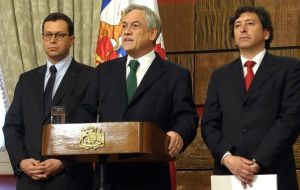MercoPress. South Atlantic News Agency
San Jose tragedy: Piñera demands resignation of mining regulatory board
 President Piñera during his statement
President Piñera during his statement Chilean president Sebastián Piñera called for the resignation of top officials from the national mining regulatory body (the National Geologic and Mining Service of Chile, Sernageomin) as a result of last Thursday’s mine collapse in northern Chile, where 33 miners remain trapped. Sernageomin’s national director, the regional director and the sub-director of were all named in the announcement.
“We have ordered a thorough restructuring of Sernageomin,” the president said. “This will allow us to modernize and update services… We have information proving that there have been many failures, many errors and many omissions on their part”.
Piñera met with Alejandro Vio, Rodolfo Díaz and Exequiel Yanes individually Wednesday morning to ask them to resign, after meeting with Mining Minister Laurence Golborne and Interior Minister Rodrigo Hinzpeter.
Sen. Camilo Escalona, of the Socialist Party, called the president’s decision unfair, and said it deflected blame from other possible responsible parties onto the three officials.
“We are witnessing the violation of work safety standards by those who are responsible for the operation of the mine,” the senator said.
The restructuring of Sernageomin comes after criticism against the organization for conducting poor safety audits. Sernageomin announced Tuesday that because of its budget deficit, it had only 16 safety auditors for the more than 4,500 mines in Chile. In the Atacama Region (III) where the collapsed San José mine is located, only three auditors oversee 844 mining areas.
“Our precarious budget dictates that we have a tremendous shortage of personnel tasked with safeguarding the lives of miners” said the president of Sernageomin’s workers’ association, Luis Lira. With the current number or auditors, he said, it was “impossible” to effectively audit each mine in Chile.
The budget is not nearly enough, said Lira, adding that an idea circulating to triple the budget of the organization would only be enough to add six more auditors, which would still be insufficient.
A mining expert in Chile, who spoke to the Santiago Times but who asked not to be named, said that while there probably are too few auditors, the number is not the crucial problem. Instead, he pointed to the loyalty most auditors have to the private sector.
“Auditors hold transitory posts at Sernageomin and come directly from the mining industry,” explained the expert. “After they complete their contract at Sernageomin, they most often go right back to the mining industry. These auditors have no incentive to crackdown on safety regulations in the mines. They are trying to foster business connections. They don’t want to become enemies of the mining companies and their audits often let some things slide that should not be overlooked.”
Meanwhile, labour unions aimed their criticisms at the company in charge of the San José mine, San Esteban Primera, and at the state, for not properly controlling mining activities, especially in small and medium sized enterprises.
Raúl de la Puente, president of the National Association of Audit Workers, expressed concern about the delicate situation in the North, putting blame on various parties.
“We believe the primary responsibility lies with the company that worked and continued to work in a mine that did not have proper security,” he said. “Sernageomin must assume its responsibility, but you also have to strengthen the laws so that it has the resources necessary to carry out the audit work.”
Arturo Martínez, head of Chile’s Central Workers Union, CUT, said the mining sector’s structural problems are due to neglect by the previous governments of the centre-left Concertación coalition.
“The past administrations have disregarded the labour issue, from the legislation, working conditions to safety,” he said. “The first task is to bring the men home alive, but the second is to ensure that similar situations never happen again in Chile. We must change and reform the labor law, so that a worker will not lose his life for his jobs.”
Meanwhile, the 33 miners remain trapped (or dead?) underground near Copiapo in northern Chile since last Thursday. The rescue efforts are thus far unsuccessful and no communication has been made with survivors. Still, drilling continues with the hope that the miners may still be alive.
“For now the priority is rescuing the miners,” said Mining Minister Golborne.
“We have done and will continue to do everything humanly possible to try to rescue alive the 33 miners trapped in the depths of the San José mine,” Piñera added.
By Laura French – Santiago Times




Top Comments
Disclaimer & comment rules-

Read all commentsI wonder what the mine safety officer had to say!
Aug 13th, 2010 - 04:27 pm 0Commenting for this story is now closed.
If you have a Facebook account, become a fan and comment on our Facebook Page!